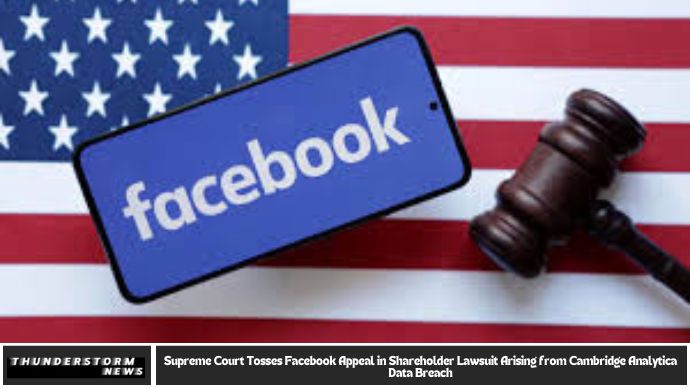In a highly anticipated legal decision, the U.S. Supreme Court has dismissed Facebook’s appeal in a shareholder lawsuit related to the Cambridge Analytica data breach. This ruling marks a significant moment in the ongoing saga of Facebook’s privacy issues and corporate governance practices. The case involves shareholders who argue that Facebook misled them about the severity of the data breach, which allegedly caused financial harm to investors. With the Supreme Court allowing the lawsuit to proceed, Facebook is now facing the prospect of legal battles and possible financial repercussions that could have lasting effects on its reputation and business practices.
This blog post will explore the details of the case, the implications of the ruling, and what it means for Facebook, its investors, and the broader tech industry. Let’s dive into the significant legal issues that are now in play and the impact of this ruling on corporate accountability in the digital age.
The Background: The Cambridge Analytica Scandal
To understand the significance of the Supreme Court’s decision, we must first revisit the infamous Cambridge Analytica scandal. In 2018, it was revealed that the political consulting firm Cambridge Analytica had harvested personal data from over 87 million Facebook users without their consent. This data was then used to influence political campaigns, including the 2016 U.S. Presidential Election.
The breach not only sparked widespread outrage but also led to regulatory investigations and massive fines for Facebook. The company faced intense scrutiny for its data protection practices and its failure to protect user privacy. As the story unfolded, Facebook’s stock price took a substantial hit, resulting in financial losses for many investors.
The Shareholder Lawsuit: What Was at Stake?
In the aftermath of the data breach, Facebook investors filed a class action lawsuit against the company, alleging that Facebook executives, including CEO Mark Zuckerberg, had failed in their duty to protect the company’s interests. The shareholders claimed that Facebook had misled them about the risks associated with the data breach, which directly impacted the company’s market value.
The lawsuit accused Facebook of being negligent and of failing to properly inform its investors about the severity of the breach. Shareholders argued that if they had known about the breach earlier, they would have taken steps to mitigate their losses.
What Happened in the Legal Battle?
The legal battle escalated as Facebook sought to have the lawsuit dismissed. In 2019, Facebook filed an appeal arguing that the shareholders’ claims were too vague and did not sufficiently demonstrate that the company’s actions directly caused financial harm.
However, the lower courts rejected Facebook’s request to dismiss the case, ruling that the investors had a valid claim. As the case moved to the U.S. Supreme Court, many observers expected the court to weigh in on the broader implications of corporate responsibility and the duty of care owed by executives to their shareholders.
Ultimately, the Supreme Court sided with the lower courts, dismissing Facebook’s appeal and allowing the lawsuit to proceed. This decision was a blow to Facebook, signaling that the company would need to face the full legal consequences of its actions in the Cambridge Analytica scandal.
Implications of the Supreme Court’s Ruling
1. Impact on Facebook
The Supreme Court’s decision is a major setback for Facebook. The company will now have to defend itself in court against allegations of shareholder negligence. If the lawsuit proceeds, Facebook could face significant financial penalties and damages. Moreover, the case could tarnish the company’s reputation, which has already been damaged by the data breach and its aftermath.
The ruling also sends a strong message about corporate accountability. The court’s refusal to dismiss the case reinforces the idea that companies, especially those dealing with sensitive user data, must be transparent with their investors about the risks they face.
2. Impact on Shareholders
For Facebook’s shareholders, the Supreme Court’s ruling represents a victory. The investors now have the opportunity to pursue legal action against the company for its role in the data breach. If they can prove that Facebook misled them, they could be entitled to compensation for their financial losses.
Moreover, the case could set a precedent for future shareholder lawsuits against companies that fail to disclose risks or take adequate measures to protect against data breaches and other corporate missteps.
3. Broader Implications for the Tech Industry
The ruling also has broader implications for the tech industry as a whole. It highlights the importance of data protection and transparency in an age where personal information is a highly valuable commodity. The case sets a precedent for how tech companies should handle data privacy concerns and how they must be held accountable for any breaches.
The ruling also raises questions about the responsibility of executives in ensuring that their companies operate ethically and transparently. If tech companies face increased legal scrutiny in the wake of data breaches, we may see a shift in how they approach user privacy and corporate governance.
4. Corporate Accountability and Shareholder Rights
The decision also brings into focus the issue of corporate governance and the rights of shareholders. For years, investors have voiced concerns about the lack of transparency from companies, especially in cases involving data privacy and security. This ruling could pave the way for more shareholder lawsuits against companies that fail to disclose risks or mismanage corporate resources.
It signals a shift toward greater accountability for corporate executives and reinforces the idea that companies must act in the best interests of their shareholders, even when faced with scandals or data breaches.
What Are the Legal and Financial Ramifications for Facebook?
The legal and financial ramifications for Facebook are substantial. The lawsuit could result in costly damages if the court finds that Facebook executives were negligent in disclosing the risks associated with the data breach. Additionally, Facebook could face more regulatory scrutiny, including further investigations by the Federal Trade Commission (FTC) and the European Union’s data protection regulators.
Furthermore, Facebook’s public image could suffer even more if the case draws further media attention. This could lead to a loss of user trust and, in turn, negatively impact the company’s bottom line.
May you also like it:
‘I’m Single Now’: Arjun Kapoor Confirms Separation from Malaika | Latest…
Prue Leith Says Gregg Wallace Shouldn’t Be Sacked but Brands Him…
The Role of Tree Surgeons in Environmental Conservation
FAQ’s
1. What is the Cambridge Analytica data breach?
The Cambridge Analytica data breach involved the unauthorized collection of personal data from over 87 million Facebook users. This data was used for political campaigning, leading to significant privacy concerns and legal repercussions for Facebook.
2. What is the shareholder lawsuit about?
The lawsuit alleges that Facebook executives failed to protect shareholders by not disclosing the full extent of the risks posed by the Cambridge Analytica data breach, leading to financial losses for investors.
3. What did the Supreme Court ruling mean for Facebook?
The Supreme Court’s decision allows the shareholder lawsuit to proceed, meaning Facebook will face further legal battles and potential financial damages for its role in the data breach.
4. Could Facebook face penalties as a result of the lawsuit?
Yes, if the shareholders can prove their case, Facebook could be ordered to pay damages to investors and face additional regulatory fines related to the data breach.
5. What does the ruling mean for corporate accountability?
The ruling emphasizes that companies, especially tech firms, must be transparent with their investors about potential risks, including data privacy breaches, and act in the best interests of their shareholders.
6. How could this ruling impact the tech industry?
The case sets a precedent for greater corporate responsibility and could lead to increased legal scrutiny and stricter regulations around data privacy for tech companies in the future.
Conclusion
The U.S. Supreme Court’s decision to toss Facebook’s appeal in the shareholder lawsuit over the Cambridge Analytica data breach is a landmark moment in the ongoing battle for corporate accountability in the tech industry. While Facebook faces significant legal and financial challenges, this case also serves as a warning to other tech companies about the importance of transparency, data protection, and responsible corporate governance.
For shareholders, the ruling is a potential victory, offering them an opportunity to seek compensation for the financial losses they incurred as a result of the breach. And for the tech industry at large, this case underscores the need for companies to prioritize user privacy and adhere to stricter data security standards in an increasingly digital world.
As this lawsuit progresses, it will undoubtedly continue to make headlines and serve as a critical test of corporate responsibility in the tech sector. The ultimate outcome could reshape how companies approach data security and how they are held accountable for the protection of their users and investors alike.






